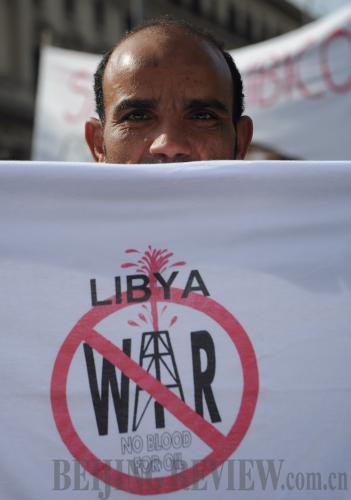|
Costs of intervention
 |
|
ANTI-WAR MOVEMENT: A Libyan protests against Western-led military strikes during a demonstration in Rome on March 26 (WANG QINGQIN) | Military strikes against Libya aimed to sustain the West's hegemony in the Middle East. But in effect, they could hasten the collapse of the Western-dominated regional order.
Shortly after his inauguration, Obama made speeches in Turkey and Egypt, expressing the desire to respect the Islamic religion and Muslims. He also vowed to amend the United States' relationship with Muslim countries. Now, however, he has started a war with a Muslim country. The move damaged his image as an advocate for peace and reform that he spent time and effort building.
The military action created another hotspot of regional conflict, making the volatile Middle East more unstable. It will also lead to complicated economic consequences. International crude oil prices have already gone up due to the quantitative easing monetary policy of the United States and social unrest in the Middle East. The war in Libya added to the unpredictability of those prices. Rising energy prices could lead to inflation in the region and beyond.
Military action always costs large amounts of money. Debt-ridden Western countries, like France, Britain and the United States, have to implement tough austerity measures to finance their operations in Libya. If the war does not end quickly, growing military expenses will worsen Western countries' debt problem and slow down their economic recovery.
Economic and military power plus regional allies—such as Israel, Egypt, Saudi Arabia, Jordan and Turkey—were the major ways in which the West maintained its hegemony over the Middle East after World War II. By establishing this order, it guaranteed Israel's safety while pocketing oil profits.
With the development of globalization and multi-polarization in the 21st century, changes happened both in the West and in the Middle East. Western powers conducted military operations in Afghanistan and Iraq after the September 11, 2001 terrorist attacks on the United States. But neither of the two wars has completely ended, showing the West is unable to reshape the Middle East.
Along with its economic development and political reform in recent years, the West's traditional ally Turkey has adopted a more independent foreign policy. When it comes to the Iranian nuclear issue and relations with Israel, for instance, Turkey does not follow Western policies.
The recession sparked by the 2008 global financial crisis has further limited Western countries' capacity to support their allies in the Middle East. In March, Hosni Mubarak, an important ally of the West, was forced to step down as Egyptian president. Other Western allies like Saudi Arabia and Jordan also faced pressure to reform.
Afraid of losing its dwindling position in the Middle East, the West acted quickly against Gaddafi. But this action may hurt Western powers if they cannot bear the heavy burdens and costs of the conflict.
The author is an associate research fellow with the China Institute of International Studies | 